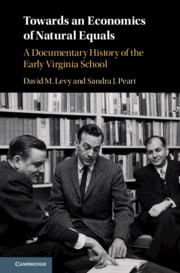Book contents
- Towards an Economics of Natural Equals
- Frontispiece
- Towards an Economics of Natural Equals
- Copyright page
- Dedication
- Contents
- Figures
- Tables
- Preface
- Acknowledgments
- 1 Why the Virginia School of Political Economy Matters
- 2 James Buchanan and the Return to an Economics of Natural Equals
- 3 “Almost Wholly Negative”: An Early Reaction to the Virginia School
- 4 “The Economics of Universal Education” and After: From Friedman to Rawls
- 5 Virginia Political Economy and Public Choice Economics
- 6 The Individuals and Their Connections
- 7 The Role of the Earhart Foundation in the Early Virginia School
- 8 The Virginia School and the Anti-democratic Right
- 9 Neoliberalism, the Virginia School, and the Geldard Report
- 10 Conclusion: Should the Virginia School be Restored?
- Select Bibliography
- Index
4 - “The Economics of Universal Education” and After: From Friedman to Rawls
Published online by Cambridge University Press: 16 December 2019
- Towards an Economics of Natural Equals
- Frontispiece
- Towards an Economics of Natural Equals
- Copyright page
- Dedication
- Contents
- Figures
- Tables
- Preface
- Acknowledgments
- 1 Why the Virginia School of Political Economy Matters
- 2 James Buchanan and the Return to an Economics of Natural Equals
- 3 “Almost Wholly Negative”: An Early Reaction to the Virginia School
- 4 “The Economics of Universal Education” and After: From Friedman to Rawls
- 5 Virginia Political Economy and Public Choice Economics
- 6 The Individuals and Their Connections
- 7 The Role of the Earhart Foundation in the Early Virginia School
- 8 The Virginia School and the Anti-democratic Right
- 9 Neoliberalism, the Virginia School, and the Geldard Report
- 10 Conclusion: Should the Virginia School be Restored?
- Select Bibliography
- Index
Summary
Buchanan’s and Nutter’s 1959 “Economics of Universal Education” has generated intense controversy. Their analysis of education financed through a voucher system is read as offering Virginia racists a method to resist the integration mandated by the Supreme Court. Their comparison of a public school system to majority rule and a voucher system to proportional representation provides some context to the controversy. The Knightian background explains why, in the 1965 republication of their essay, they deemed segregated schools to be ineligible for state support. Buchanan returned to the context of the inequality of racial outcomes in which he adopted a Rawlsian notion of the “fair chance” to which all individuals are entitled. He formulated a social contract in which the randomness of market outcomes is accepted in exchange for being judged on competence. Buchanan argued for a government policy of quotas in hiring so that individuals might prove their competence. In line with this reasoning, Buchanan also renounced his previous support of a voucher system for education.
Keywords
- Type
- Chapter
- Information
- Towards an Economics of Natural EqualsA Documentary History of the Early Virginia School, pp. 93 - 138Publisher: Cambridge University PressPrint publication year: 2020

